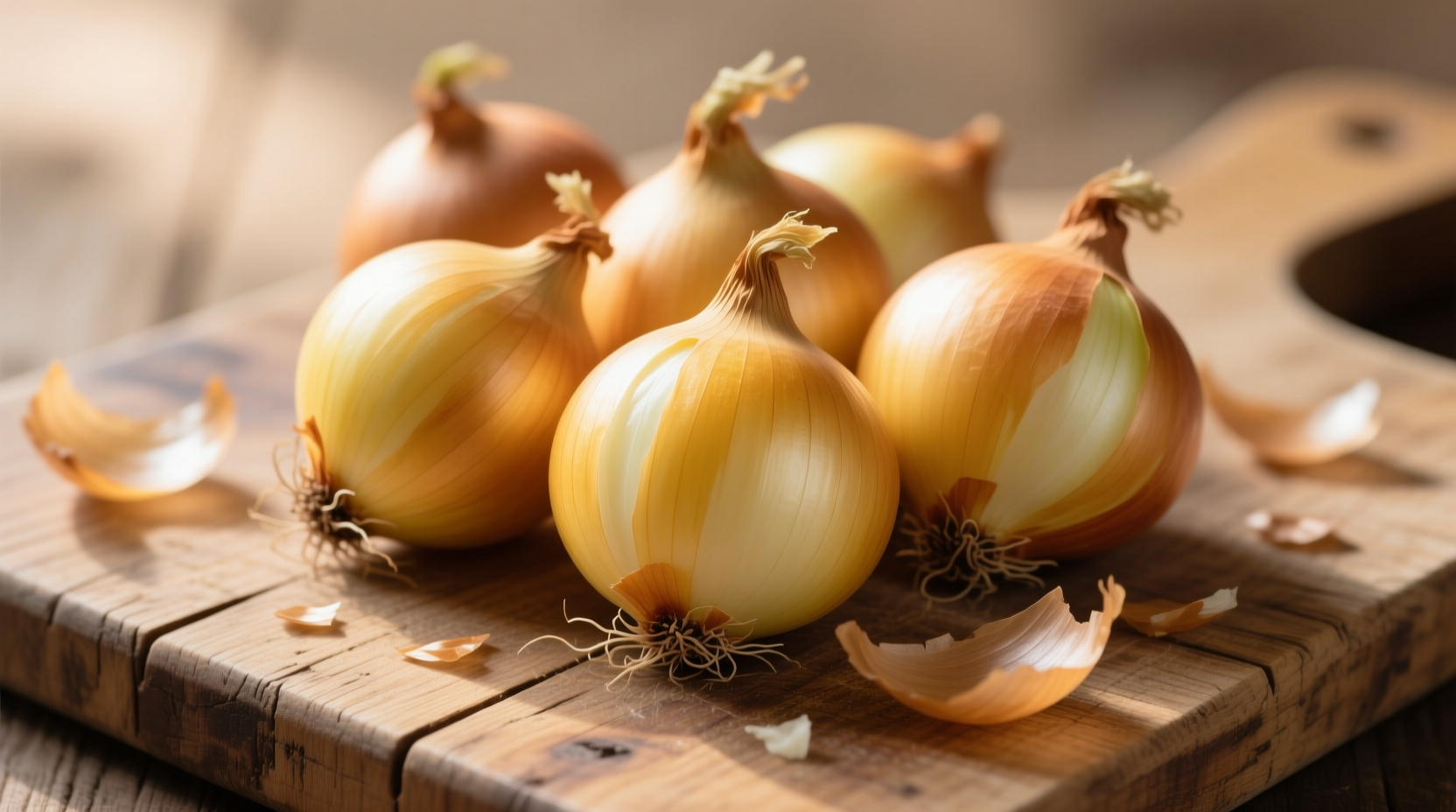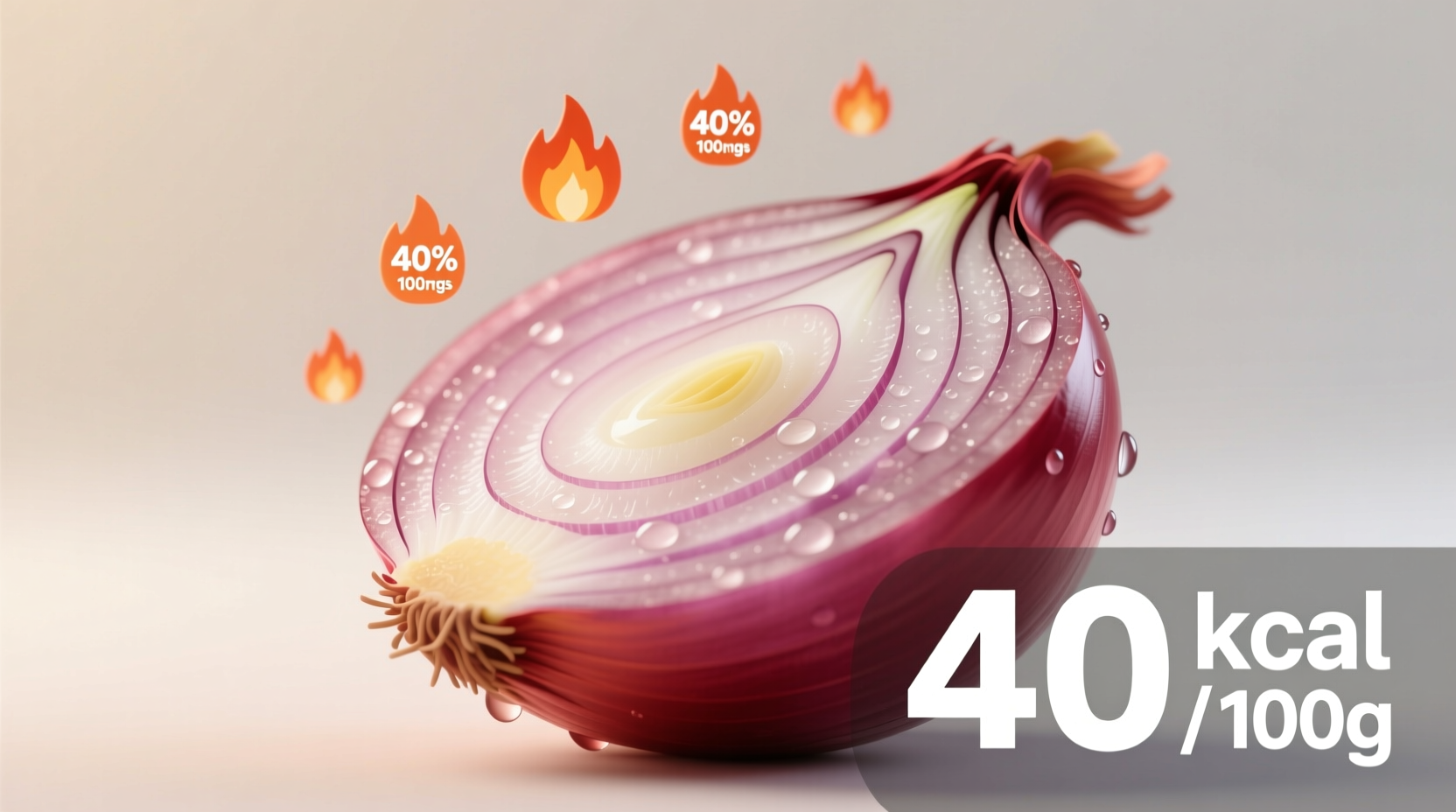Understanding the exact calorie content of common ingredients like onions is essential for meal planning, diet tracking, and maintaining balanced nutrition. Whether you're counting calories for weight management or simply curious about your food's nutritional profile, knowing how many calories are in one onion helps make informed dietary choices.
Onion Calorie Breakdown by Size and Type
Not all onions are created equal when it comes to calorie content. The exact count depends on variety, size, and preparation method. Here's a detailed reference based on USDA FoodData Central measurements:
| Onion Type | Size/Weight | Calories | Carbohydrates |
|---|---|---|---|
| Yellow onion (raw) | Medium (110g) | 44 | 10g |
| Yellow onion (raw) | Large (170g) | 67 | 15.5g |
| Red onion (raw) | Medium (110g) | 42 | 9.8g |
| White onion (raw) | Medium (110g) | 45 | 10.3g |
| Green onions (scallions) | 1 cup (100g) | 32 | 7.3g |
| Shallot (raw) | 1 ounce (28g) | 26 | 6.2g |
Source: USDA FoodData Central (accessed September 2025) - https://fdc.nal.usda.gov/
Why Onion Calories Matter in Your Diet
While onions aren't calorie-dense, their nutritional contribution extends beyond simple calorie counting. Understanding calories in one onion helps contextualize their role in healthy eating patterns:
- Onions contain just 40 calories per 100 grams, making them an excellent low-calorie flavor enhancer
- They provide dietary fiber (1.7g per medium onion) which supports digestion and satiety
- Natural sugars in onions (4.2g per medium onion) contribute to their calorie count but also provide quick energy
- Negligible fat content (0.1g per medium onion) makes onions heart-healthy
When tracking how many calories are in one onion, remember that cooking methods affect the final count. Caramelizing onions in oil adds significant calories, while roasting without added fat preserves their naturally low-calorie profile.
Practical Applications for Calorie-Conscious Cooking
Knowing the exact calories in one onion empowers smarter meal planning. Here's how to apply this information in real cooking scenarios:
Meal Prep and Portion Control
When building calorie-controlled meals, use these practical guidelines:
- Substitute half an onion (22 calories) for higher-calorie flavor enhancers like cheese or bacon in omelets
- Add one medium onion to soups and stews for flavor without significantly impacting total calories
- Use raw red onions in salads for crunch and flavor with minimal calorie addition (42 calories per medium onion)
Understanding Contextual Variations
The calories in one onion can vary based on several factors you should consider:
- Seasonal differences: Onions harvested in different seasons may have slightly varying sugar content
- Storage conditions: Longer storage can increase sugar concentration as starch converts to sugars
- Cooking methods: Raw versus cooked onions have identical calories by weight, but cooking reduces volume
For precise tracking, weigh your onions rather than relying on size estimates. A kitchen scale provides the most accurate measurement when calculating calories in one onion for your specific recipe.

Comparing Onion Calories to Other Common Vegetables
Understanding where onions fall in the vegetable calorie spectrum helps with meal planning. Here's how calories in one onion compare to similar vegetables:
- Medium onion (44 calories) vs. medium bell pepper (31 calories)
- Medium onion (44 calories) vs. medium carrot (25 calories)
- Medium onion (44 calories) vs. cup of broccoli florets (55 calories)
- Medium onion (44 calories) vs. medium potato (163 calories)
Onions sit in the middle range of vegetable calories—higher than leafy greens but significantly lower than starchy vegetables. This makes them versatile for various dietary approaches, from keto to Mediterranean diets.
Common Misconceptions About Onion Calories
Several myths persist about calories in one onion that deserve clarification:
- Myth: Onions cause weight gain because they're sweet
Fact: The natural sugars in onions contribute minimally to daily intake—medium onion contains just 4.2g sugar - Myth: Cooking onions significantly increases calories
Fact: Cooking without added fat doesn't change calorie content, though it concentrates flavors - Myth: All onion varieties have identical calories
Fact: While differences are minor, red onions typically have slightly fewer calories than yellow varieties
For accurate nutrition tracking, always reference current USDA data rather than relying on generalized assumptions about how many calories are in one onion.
Maximizing Nutritional Benefits While Tracking Calories
Onions offer more than just low calories—they provide valuable nutrients that support overall health:
- Vitamin C (7.4mg per medium onion) supports immune function
- B vitamins aid energy metabolism
- Antioxidants like quercetin have anti-inflammatory properties
- Sulfur compounds support cardiovascular health
When monitoring calories in one onion, remember you're getting these nutritional benefits with minimal calorie investment. This makes onions an excellent choice for nutrient-dense, calorie-conscious eating patterns.
Practical Tips for Using Onions in Calorie-Controlled Diets
Implement these strategies to maximize flavor while managing calories in one onion:
- Use raw onions in cold dishes where their sharp flavor shines without added fats
- Caramelize onions slowly with minimal oil (1 tsp for 2 onions) to concentrate natural sweetness
- Add onions early in cooking to infuse dishes with flavor, reducing need for higher-calorie seasonings
- Combine onions with herbs and spices to create complex flavors without extra calories
Professional chefs often use the calories in one onion as a baseline for building flavorful, low-calorie foundations in sauces, soups, and stir-fries. By understanding these numbers, home cooks can replicate restaurant-quality dishes while maintaining dietary goals.
Frequently Asked Questions
How many calories are in a small onion?
A small onion (approximately 80 grams) contains about 32 calories. This measurement refers to raw yellow onions, which are the most commonly used variety in cooking.
Do cooked onions have more calories than raw onions?
No, cooking doesn't change the calorie content of onions by weight. A 100g raw onion (40 calories) and 100g cooked onion have identical calories. However, cooking reduces volume, so a cup of cooked onions contains more calories than a cup of raw onions because it represents more onion by weight.
Are onions good for weight loss?
Yes, onions can support weight loss efforts. With only 44 calories for a medium onion and 1.7g of fiber, they add volume and flavor to meals without significant calories. Their natural sweetness can satisfy sugar cravings, and their sulfur compounds may support metabolic health.
How does the calorie count differ between onion varieties?
Differences are minimal but measurable. Per 100g: yellow onions have 40 calories, red onions have 39 calories, and white onions have 41 calories. Shallots are slightly higher at 72 calories per 100g. These variations come from slight differences in sugar and water content between varieties.
Can I eat unlimited onions while counting calories?
While onions are low-calorie, they still contribute to your daily intake. Extremely large quantities could affect blood sugar due to natural sugars. For most people, incorporating 1-2 medium onions daily fits within balanced eating patterns without significantly impacting calorie goals.











 浙公网安备
33010002000092号
浙公网安备
33010002000092号 浙B2-20120091-4
浙B2-20120091-4